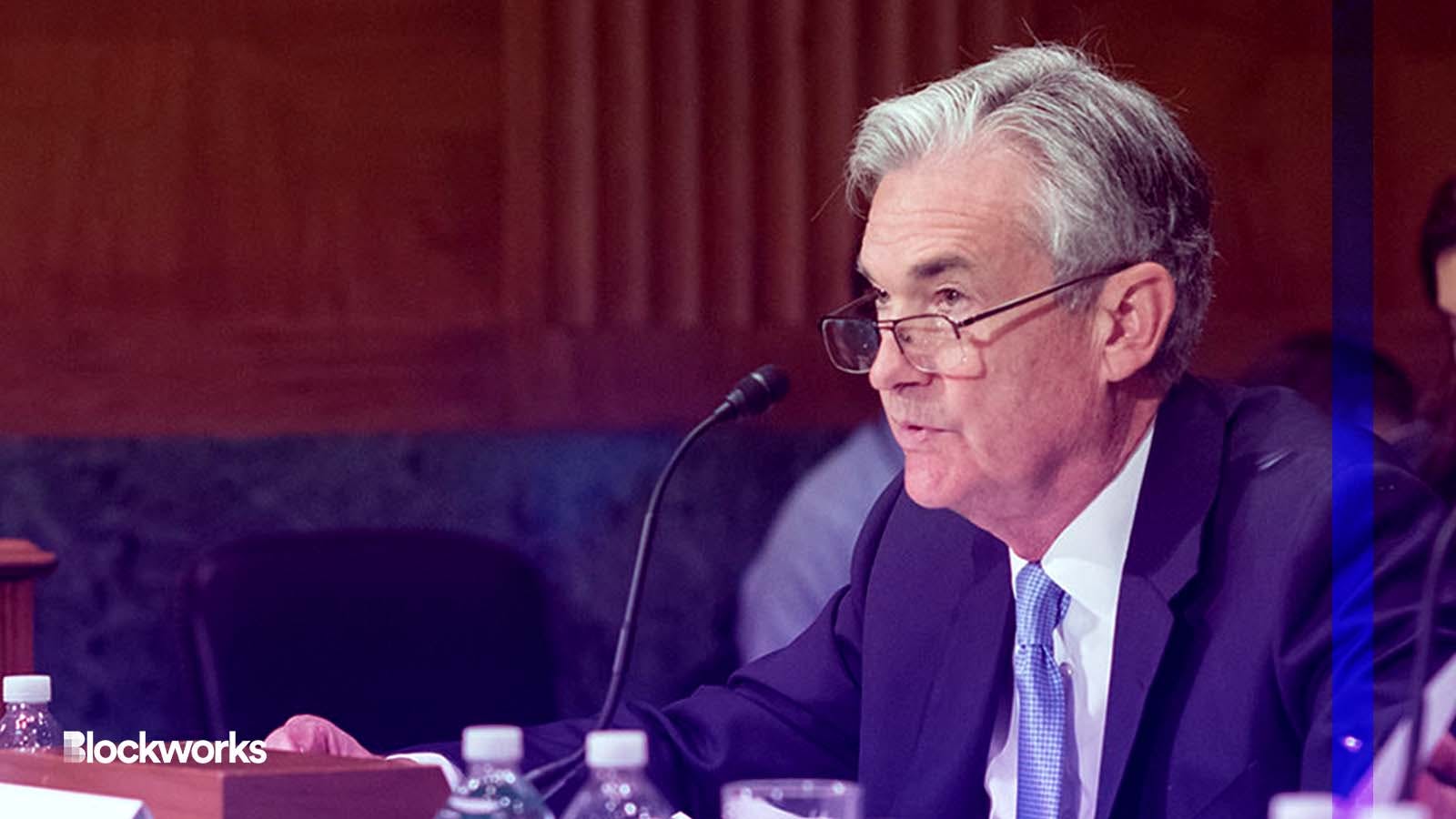Crypto Whipsaws as Powell Talks to Congress
Interest rates could end up “higher than anticipated,” the central bank chief said on Capitol Hill, Tuesday

Federal Reserve Chair Jerome Powell | Source: Federal Reserve (CC license)
Bitcoin and ether lost as much as 1.7% and 1.5% as Federal Reserve Chair Jerome Powell appeared in the Senate, before paring losses.
Risk assets took a hit Tuesday Morning as the central bank head told Senators rate hikes are here to stay.
“We would be prepared to increase the pace of rate hikes,” Powell said during remarks before the Senate Banking Committee. “Restoring price stability will likely require that we maintain a restrictive stance of monetary policy for some time.”
Equities slid too on Powell’s prepared remarks, with the S&P 500 and Nasdaq Composite indexes losing around 1% each.
The endgame for interest rates could be “higher than anticipated,” Powell noted, citing economic data that continues to show a resilient labor market and persistent inflation.
Crypto’s early dip comes as investors and industry leaders continue to parse through an increasingly hostile regulatory environment, rife with enforcement actions, limited access to fiat on and off ramps and general uncertainty about the future of the industry.
That may make traders cautious.
“Why would anyone buy crypto now, with so much regulatory uncertainty? In part, it’s because of the regulatory uncertainty,” Noelle Acheson, author of Crypto is Macro Now and former head of market insights at Genesis, wrote in a note Tuesday. “A targeted and official campaign against a particular industry is a reminder why a decentralized store of value can be an attractive “insurance” against a government overstepping its mandate.”
On stablecoins, Chair Powell, responding to Sen. Mark Warner, D-VA, reiterated the principal of “same activity same regulation,” that has been a mantra of regulators worldwide.
“That covers crypto and all kinds of other activities,” Powell said. “People are going to assume that when they deal with something that looks like a money market fund that it has the same regulations as a money market fund or a bank deposit, and stablecoins need some attention in that respect.”
Sen. Lummis, R-WY, further questioned the Fed’s policy view on stablecoins, noting that, in January, bank regulators criticized the potential issuance of stablecoins by banks on open public decentralized networks.
“I think that there are real concerns about permissionless public blockchains and the reason is that they’ve been so susceptible to fraud, to money laundering and all of those things — so I think what you heard from federal banking agencies is that they would tend to look at those as consistent with safety and soundness,” Powell said.
But, he added, properly regulated stablecoins could have a place in the US financial services sector.
Lummis, who is working on major legislation dealing with cryptoassets with New York senator Gillibrand, noted the EU’s leadership on digital asset regulation with its MiCA policy, and Powell agreed that Congress is behind in standards setting relative to its European counterparts.
The Fed’s dual mandate dilemma
In one of the more tense exchanges of the committee hearing, Sen. Elizabeth Warren, D-Mass., pressed Powell on the consequences for unemployment of the Fed’s continued interest rate hikes. Warren projected that the policy would put at least 2 million people out of work this year.
Powell defended Fed policymakers actions as necessary to contain inflation, noting that the current unemployment rate of 3.4% was the lowest in 54 years, and that its rise could be contained.
“Even 4.5% unemployment is well better than most of the time in the past 75 years,” Powell said.
Markets will be keeping an eye on Powell’s House testimony tomorrow — the second part of his Semiannual Monetary Policy Report to Congress — as well as upcoming jobs data and an updated unemployment report this week.
The Fed’s next policy setting meeting is slated for March 21-22, but FOMC members will be in a comment blackout period during these key data releases.
Updated March 7, 2023 at 11:23 am ET: Added Powell’s response to Sen. Warner; added Sen. Warren’s comment and Powell’s response; and at 12:17 pm ET, added Powell’s exchange with Sen. Lummis.
Get the news in your inbox. Explore Blockworks newsletters:
- The Breakdown: Decoding crypto and the markets. Daily.
- 0xResearch: Alpha in your inbox. Think like an analyst.






